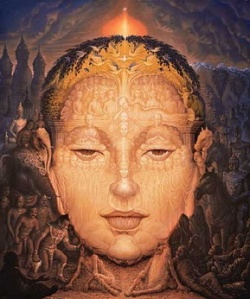Difference between revisions of "Hui-wen"
Jump to navigation
Jump to search
(Created page with "thumb|250px| <poem> '''Hui-wen''' [慧文] (n.d.) (PY Huiwen; Jpn Emon) A priest of China who lived in the sixth century. Hui-wen studied Nagarjuna's T...") |
|||
| (One intermediate revision by the same user not shown) | |||
| Line 1: | Line 1: | ||
[[File:Bud 0.jpg|thumb|250px|]] | [[File:Bud 0.jpg|thumb|250px|]] | ||
| + | |||
| + | |||
<poem> | <poem> | ||
| − | + | [[Hui-wen]] | |
| − | [慧文] (n.d.) (PY Huiwen; Jpn Emon) | + | [[慧文]] (n.d.) (PY [[Huiwen]]; Jpn [[Emon]]) |
| + | |||
| + | A [[priest]] of [[China]] who lived in the sixth century. [[Hui-wen]] studied [[Nagarjuna's]] [[Treatise on the Middle Way]] and [[Treatise on the Great Perfection of Wisdom]] and devoted himself to the [[practice of meditation]]. | ||
| + | |||
| + | He is said to have [[awakened]] to the [[three kinds of wisdom]] in a single [[mind]] and the [[three truths]] of [[nonsubstantiality]], temporary [[existence]], and the [[Middle Way]]. | ||
| + | |||
| + | [[Hui-wen]] transferred his teachings to [[Nan-yüeh]]. | ||
| − | + | One [[view]] regards him as the founder of the [[T'ient'ai]] school, [[Nan-yüeh]] as its [[second patriarch]], and [[T'ient'ai]], its [[third patriarch]]. Another [[view]] regards [[Hui-wen]] as its second [[patriarch]], in which case [[Nagarjuna]] is considered the founder. | |
| − | See also three kinds of wisdom; three truths. | + | See also [[three kinds of wisdom]]; [[three truths]]. |
</poem> | </poem> | ||
{{R}} | {{R}} | ||
Latest revision as of 09:31, 4 January 2016
Hui-wen
慧文 (n.d.) (PY Huiwen; Jpn Emon)
A priest of China who lived in the sixth century. Hui-wen studied Nagarjuna's Treatise on the Middle Way and Treatise on the Great Perfection of Wisdom and devoted himself to the practice of meditation.
He is said to have awakened to the three kinds of wisdom in a single mind and the three truths of nonsubstantiality, temporary existence, and the Middle Way.
Hui-wen transferred his teachings to Nan-yüeh.
One view regards him as the founder of the T'ient'ai school, Nan-yüeh as its second patriarch, and T'ient'ai, its third patriarch. Another view regards Hui-wen as its second patriarch, in which case Nagarjuna is considered the founder.
See also three kinds of wisdom; three truths.
